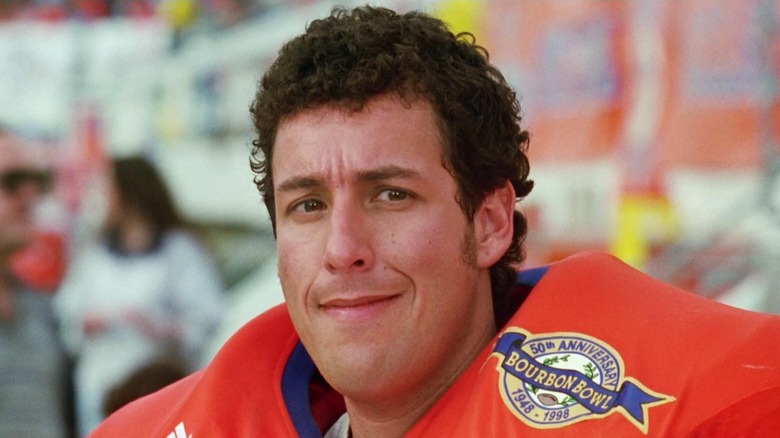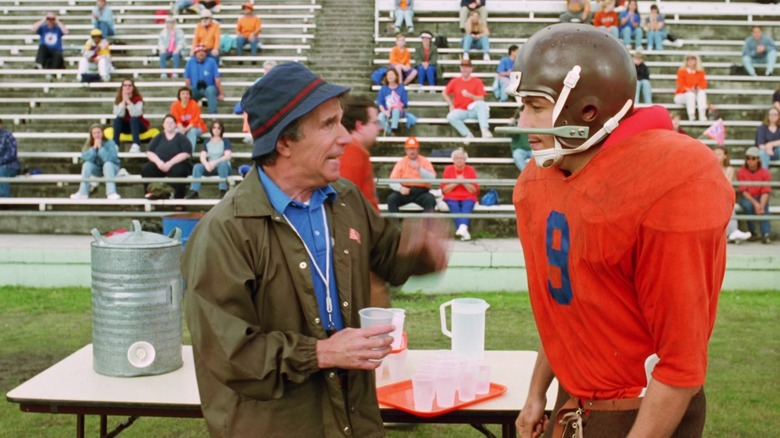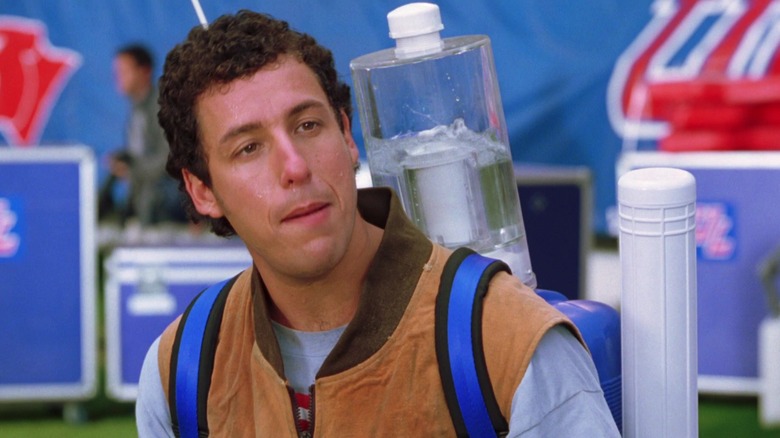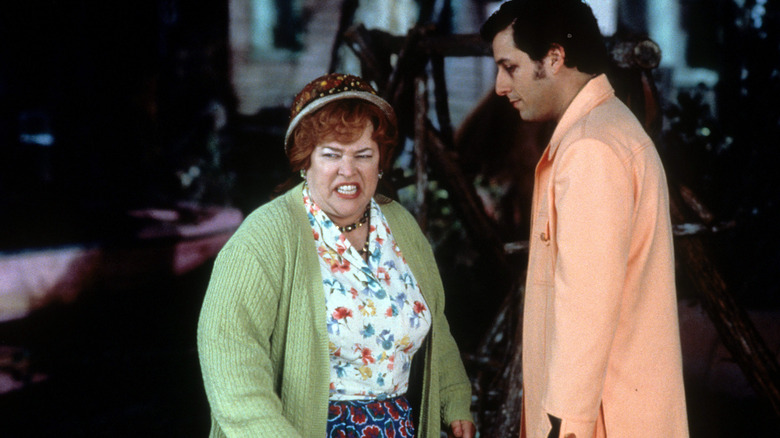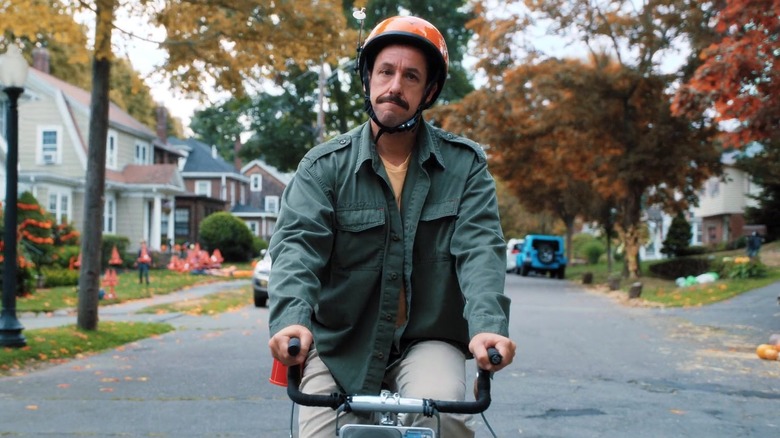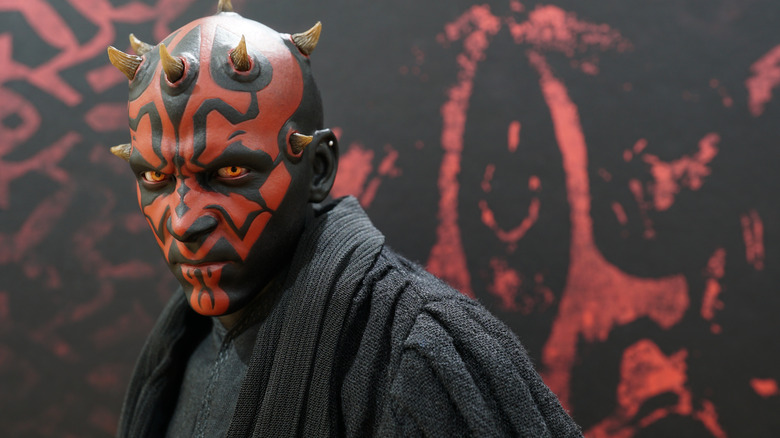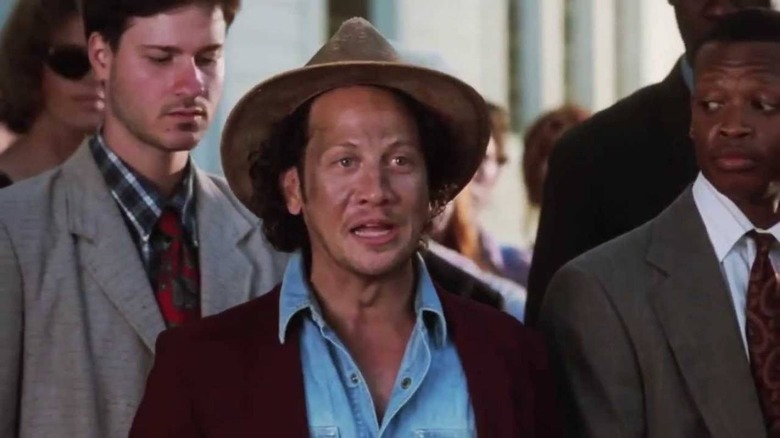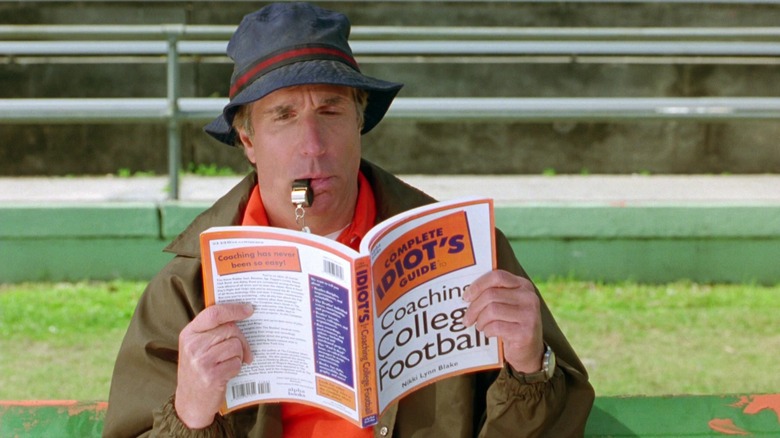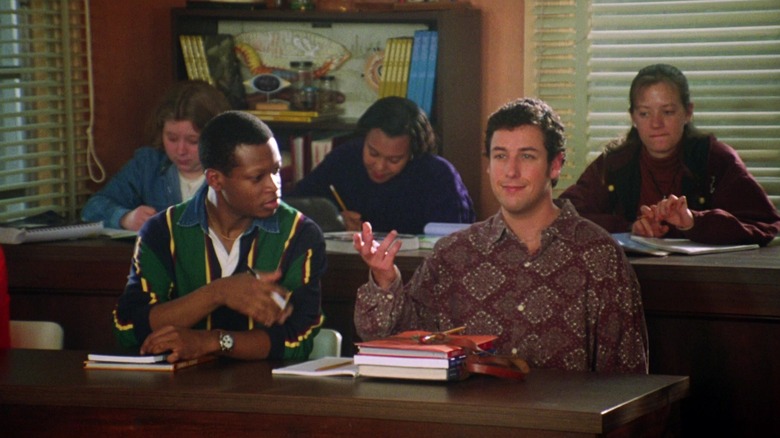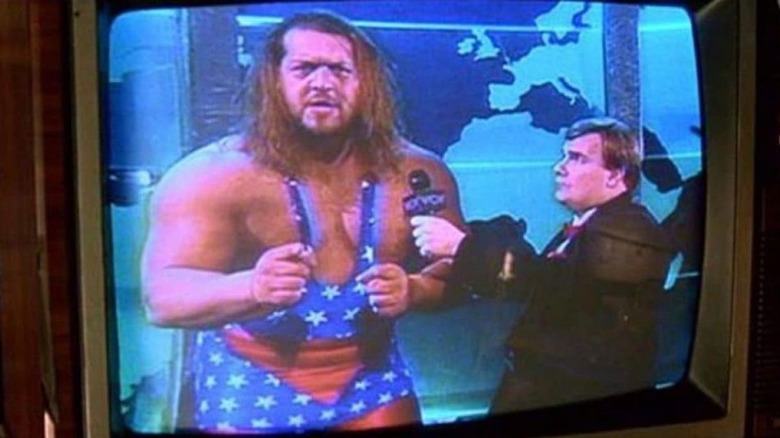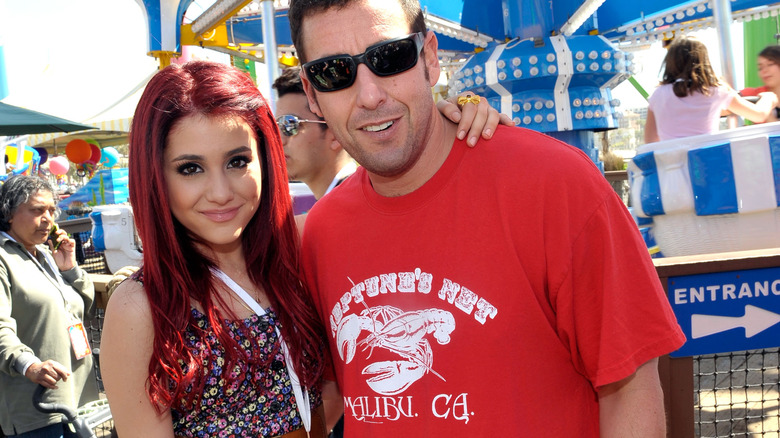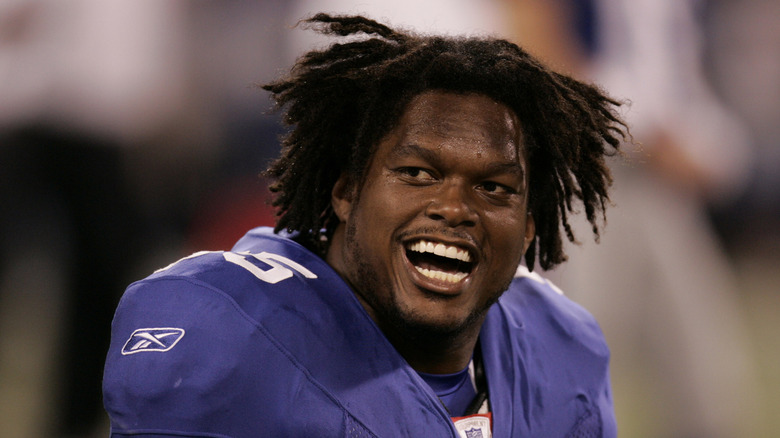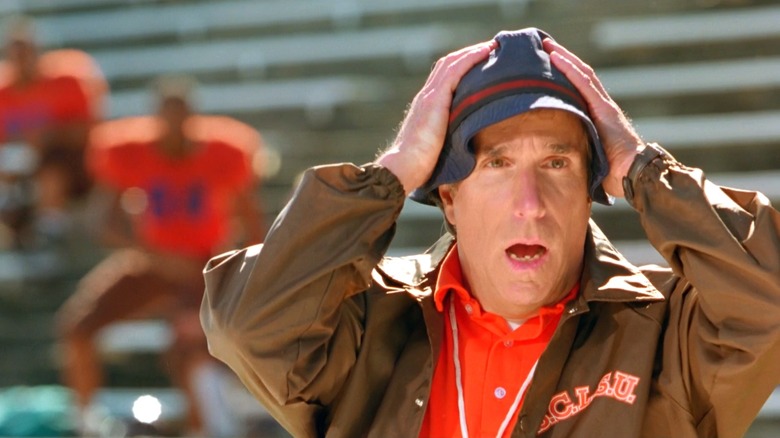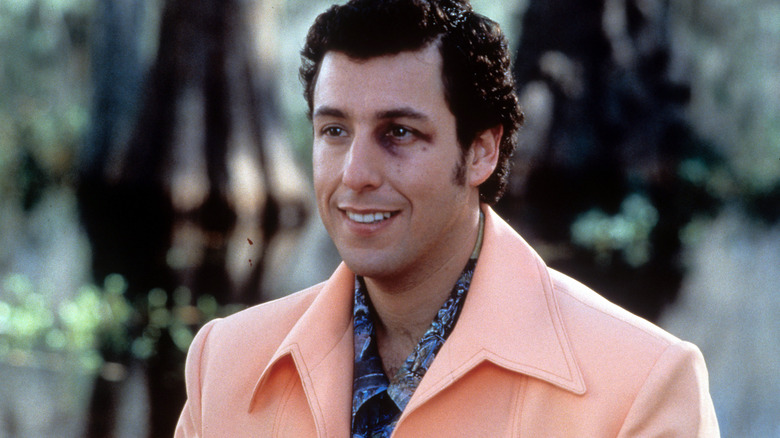The Untold Truth Of The Waterboy
Today, Adam Sandler is known as one of the biggest comedy movie actors of all time. Before climbing Hollywood's ladder to the A-list, Sandler was a cast member on television's most famous sketch comedy show, "Saturday Night Live." In the mid-1990s, Sandler started making a name for himself in movies, notably "Billy Madison" in 1995 and "Happy Gilmore" in 1996, which made healthy profits at the box office.
It was 1998's "The Waterboy" that finally launched Sandler's career into the stratosphere. Filled with many notable actors in the supporting cast, including Kathy Bates, Henry Winkler, and Fairuza Balk, "The Waterboy" told the story of Robert "Bobby" Boucher Jr., played by Sandler. Bobby is a well-meaning but slow-witted youth whose dreams of serving water, playing football, and finding romance are held back due to his love for his domineering mother (Bates).
"The Waterboy" became the first film in Sandler's career to make more than $100 million domestically. It turned the actor into a comedy superstar alongside the likes of Jim Carrey and Steve Martin. In the decades since its release, the movie has come to be regarded as a classic. The history behind the making of "The Waterboy" is a fascinating one. Let us take a look at some of the surprising events that led up to the creation of the beloved comedy.
It was inspired by an SNL sketch
Adam Sandler started his Hollywood career as a standup comic and sketch comedy artist. Many of the ideas that Sandler would use later in his movie career were inspired by his time working on "Saturday Night Live." The iconic sketch show was also responsible for the idea that eventually evolved into "The Waterboy."
On "SNL," Sandler made a name for himself singing parodies on his guitar and playing offbeat characters with interesting quirks. Like "Canteen Boy," an assistant scoutmaster who behaves in a childlike manner, pays great attention to detail, and is always seen wearing a water canteen around his neck. If that description sounds very similar to Bobby Boucher, it's no coincidence.
"You could compare [Bobby] to 'Canteen Boy,'" Sandler told CNN in an interview. "Whereas he does love water and they both get picked on a lot." While Canteen Boy inspired "The Waterboy," Bobby Boucher is a better-developed character whose most noticeable quality, Sandler said, is that "he is a genuine, good person." It was this goodness that made Bobby Boucher into something deeper than a character in a sketch, someone whose journey audiences would want to follow over the length of an entire film.
Everyone loves Bobby Boucher
Right from the start of his career in films, Adam Sandler made a name for himself playing emotionally stunted man-children with anger issues. The anger issues toned down a bit by the later stages of his career, but at the time of "The Waterboy," Sandler was still best known for playing guys who did not always behave in the nicest manner. This was a formula that "The Waterboy" inverted. Instead of having Sandler play an over-the-top zany character in a regular world, screenwriter Tim Herlihy told SB Nation that this movie changed things up by having Sandler's Bobby Boucher be the nice, relatively sane guy surrounded by whacky characters who accentuated how nice and well-meaning Bobby himself was.
Playing Bobby proved a nice change of pace for Sandler. When he was asked during an interview with The Harvard Crimson which of Sandler's characters he would want to be stuck on a marooned island with, the actor picked Bobby as his companion of choice (next to Billy Madison), adding that he would "let Bobby [rest] his head on [his] lap and sleep." Also, who better to help you survive on a desert island than a guy who has spent his life learning to collect and ration drinking water?
Kathy Bates tossed the script in the trash
One of the biggest surprises in "The Waterboy" when it first came out was seeing veteran dramatic actress Kathy Bates hamming it up to glory in the role of Bobby's domineering mother desperate to keep her son at her side forever by telling him everything outside their home was a sinful trap set by the devil.
No one thought Bates would ever want to do such an over-the-top role, not even the makers of "The Waterboy." And they were right. When Bates first got the script for the movie, she saw that it was about football. Having no interest in the sport and not having the faintest idea who the lead actor was, Bates threw the script in the trash. There, it was spotted by Bates' niece, who realized "The Waterboy" was an Adam Sandler movie.
"[My niece] pulled it out, and she said, 'Adam Sandler! You don't know the Hanukkah song [from 'SNL']?" Bates told Snoop Dogg in an interview. "[My niece told me] 'You have to do this movie!' And she was right. We had so much fun. Unbelievable." Thanks to that bit of prodding, Bates accepted the unusual role of Bobby's mom, Helen, which ended up becoming one of the best-remembered roles of the actress' illustrious career.
The film is related to Hubie Halloween
"The Waterboy" had Adam Sandler playing one of the most vulnerable characters of his entire career. Bobby Boucher was the town outcast who was bullied by everyone around him but maintained a dogged determination to be kind and helpful to others because of his strong love for his mother that extended to the rest of humanity. Echoes of these character traits can be found in Hubie Dubois, Sandler's hero from 2020's "Hubie Halloween." Much like Bobby, Hubie is his town's walking punchline, has an awkward way of talking, and cares far more for his neighbors than they do for him. These similarities were not a coincidence. In fact, Sandler told Yahoo Entertainment that Hubie's full name is a reference to Bobby Boucher since the two characters are so similar.
With "Hubie Halloween" chock-full of references to many of Sandler's past movies, the actor went a step further in the same interview and entertained that all his movies take place within a collective "Sandlerverse," which might one day lead to an epic crossover among the various characters Sandler has played over the years. So fingers crossed for the day we might get to see Hubie and Bobby save the day together.
The Phantom Menace helped The Waterboy
The biggest movie news around the time of the release of "The Waterboy" was that "Star Wars: Episode I — The Phantom Menace" was going to be released soon after. Fans were agog to see the next part in George Lucas' iconic sci-fi series. The original "Star Wars" trilogy had ended, and CGI had advanced far enough to expand the world of the franchise in a compelling manner. Thus "The Phantom Menace" was primed to generate a large amount of hype as the starting point for a new "Star Wars" trilogy. This actually ended up helping "The Waterboy."
According to a report by The New York Times from that era, the fact that "The Phantom Menace" trailer was attached to "The Waterboy" and a few other lesser-known movies meant that "Star Wars" fans would buy tickets for the smaller movies purely so they could watch the two-minute trailer at the start of the show and leave. This helped bump up the ticket sales for "The Waterboy" and gave it longer legs at the box office.
You can do it! was always going to be big
In many ways, "The Waterboy" laid the groundwork for the way Adam Sandler would make his movies for the rest of his career. A feel-good story, a likable lead, and a bunch of comedians who all happen to be close friends with Sandler in real life. One such comedian was Rob Schneider, who knew Sandler from their days on "SNL" together, Schneider said in an interview with Us Weekly.
One of the highlights of "The Waterboy" was Schneider's supporting role as the Townie, who delivers the famous line, "You can do it!" The line became an internet meme before internet memes were a thing. It became a running gag to have Schneider say the line in other Sandler movies, and Sandler returned the favor when he guest-starred in Schneider's movie "The Animal." The fact that the line would be such a hit was already known to Sandler before "The Waterboy" ever released.
"[Adam] called me two weeks before the movie came out," Schneider said. "[He said,] 'In two weeks, 'The Waterboy' is going to come out and you're not going to be able to go anywhere without hearing, 'You can do it!'"
Henry Winkler randomly landed his role
As perfect as Henry Winkler was in the role of the hapless Coach Klein in "The Waterboy," that bit of casting was highly unusual at the time. Back then, Winkler was still known as the epitome of cool. Arthur "The Fonz" Fonzarelli from the classic TV show "Happy Days" was the last guy you could imagine playing Coach Klein.
After "Happy Days" ended, Winkler found himself cursed with the same problem of typecasting that applied to most actors known for a highly specific breakout television character. Despite being a character actor at heart, Winkler found few opportunities to showcase his range until "The Waterboy" came along.
While Adam Sandler was on "SNL," he sang "The Chanukah Song," which name-dropped Winkler. The actor called Sandler to thank him for the shout-out, and the two ended up becoming friends. That in turn led to Sandler casting Winkler as Coach Klein in a role that was the polar opposite of how the actor was perceived at the time. Thanks to the success of "The Waterboy," Winkler received a fresh boost to his career that allowed him to finally put "The Fonz" behind him and establish a new reputation as a character actor.
A very different original plot
What makes "The Waterboy" work for both football fans and non-football fans is that the movie is not really about the sport itself. Rather, "The Waterboy" is a heartfelt satire of small-town life where the pride of the residents becomes intricately linked with their home team and small-town folks dream of doing something bigger with their life.
While the character of Bobby Boucher was already decided upon as a continuation of Canteen Boy from "SNL," the backdrop for the character's story almost had a completely different New England setting. That was an idea that was explored early on by the film's writer, Tim Herlihy. "At one point, we talked about doing it in black and white and set in the '50s," Herlihy told SB Nation. He added that if they had pursued that idea, "It would've been a very different movie," while also admitting he did not know enough about the New England college football scene to make the premise work. In the end, the team behind "The Waterboy" decided to place the story in Louisiana after a Mardi Gras trip they took inspired them to make a satire of what audiences think people in the South sound and act like.
The giant-sized cameo
Before finding his calling as a linebacker, Bobby Boucher leads an incredibly repressed life. He finds a passive outlet for his aggression by avidly following professional wrestling. Bobby's favorite wrestler is a giant man called "Captain Insano," whom Bobby dreams of working for as a water boy.
Wrestling fans will notice that the role of Captain Insano is played by Paul Wight, better known in wrestling circles as "The Big Show." The 7-foot giant has long been a star in the world of professional wrestling and made several forays into movies. Despite his brief screen time, Captain Insano proved a big hit with audiences, so much so that Wight claims he has bought the rights to the character from the studio that owns "The Waterboy." The wrestler intends to bring the fictional wrestler into the real world as a fresh new in-ring persona for AEW (All Elite Wrestling). The biggest difference according to Wight will be that the new version of Insano will not be rocking his luxurious locks from the movie.
Ariana Grande once played Bobby Boucher
2020 was a tough year for everyone everywhere. The pandemic was raging, and all you could do was hunker down within your home and try to keep your mind off the bad stuff by rewatching old shows and movies. Many classics received a boost in popularity during that time period, including "The Waterboy," thanks to Ariana Grande.
The famous pop star took to social media to post a clip of herself embracing her inner Adam Sandler acting as Bobby Boucher in a scene from the movie. Grande went the extra mile by dressing up like Bobby and wearing appropriate makeup to present the appearance of a black eye. The role of Bobby's mom was played by Grande's own mother. Finally, the pop sensation's former castmate Elizabeth Gillies played Bobby's love interest, Vicki Vallencourt.
The clip rapidly went viral on various social media outlets. Grande's attention to detail while portraying Bobby's awkward mannerisms received particular praise. The trending clip caught Sandler's attention, and the actor gave his blessings to Grande's efforts by tweeting, "Bobby Boucher approves of this message."
The real Bobby Boucher?
Even though Bobby Boucher was based on a previous character, "Canteen Boy," playing the role of a star linebacker was a novel experience for Adam Sandler. The actor knew that he had to take care not just of his acting, but also the physical aspects of playing Bobby and looking like he actually belonged on the football field with other players. To that end, Sandler prepared for his role by watching real-life linebackers go about their work during football games. One player whom the actor paid special attention to was former All-Pro NFL linebacker LaVar Arrington. In fact, Arrington even goes so far as to declare himself the real-life Bobby Boucher who directly inspired Sandler's take on the iconic character. "A lot of people don't realize that I'm the 'Waterboy,'" Arrington told Fox Sports Radio.
"[Sandler is] a big Penn State fan," he continued, "and came to Penn State to watch the linebackers of 'Linebacker U,' and more specifically, LaVar Arrington." The former pro linebacker also pointed out that the "Number 9" shirt Bobby wears in the movie is Arrington's high school number and that Sandler's movements on the football field closely resemble Arrington's "reckless abandon" from his college playing days.
Henry Winkler still has part of his movie tattoo
At one point in "The Waterboy," Coach Klein arrives at Bobby's house to offer him a football scholarship for college. While Bobby is thrilled, his mother nixes the idea with great firmness. Cowed by his mother, Bobby regretfully says no to Klein. Before leaving, Klein reveals the "Roy Orbison" tattoo on his butt that he got without his mother's permission as a way to encourage Bobby to continue playing college football in secret.
The tattoo is one of the most unexpected moments in the movie, and you are never quite sure whether that was really Henry Winkler with the giant tattoo on his posterior or a body double. As it turns out, not only did Winkler get the tattoo for the movie, but he still has part of it on his body as a way to honor his character in "The Waterboy."
Winkler told WGN-TV (via Outsider) that he "had [the tattoo] removed by laser" before going on to reveal that he kept the "Roy Orbison's glasses" part of the tattoo. A strange but rather sweet way to commemorate the strange but sweet movie that turned Winkler's career around.
The film had a highly mixed reaction
Adam Sandler might just be one of the most controversial stars in the history of Hollywood. Not because of his personal life, but because of how deeply his movies appear to divide critics and general audiences. Influential reviewers frequently lambast Sandler's comedy movies as simplistic, formulaic, and cheap, but that doesn't stop audiences from turning out to see them in droves.
This deepening schism started appearing right from the time of "The Waterboy." The film became Sandler's first bonafide blockbuster, grossing more than $100 million at the international box office. The movie was also torn apart by critics. Sandler was nominated for the Golden Raspberry award for worst actor, but ironically he also won the Blockbuster Entertainment Award for Favorite Actor — Comedy for the same movie.
"It's never been my drive, and it's never been Sandler's drive [to please critics]," "The Waterboy" director Frank Coraci told SB Nation with regards to the movie's mixed reception. "We just really wanna make movies that we believe in, that are funny, that make you feel some good things and have a positive message and that are entertaining." Beyond critics reviews and box office numbers, the biggest testament to the success of "The Waterboy" in the long run is the fact that the movie is still so fondly remembered decades after its initial release.
